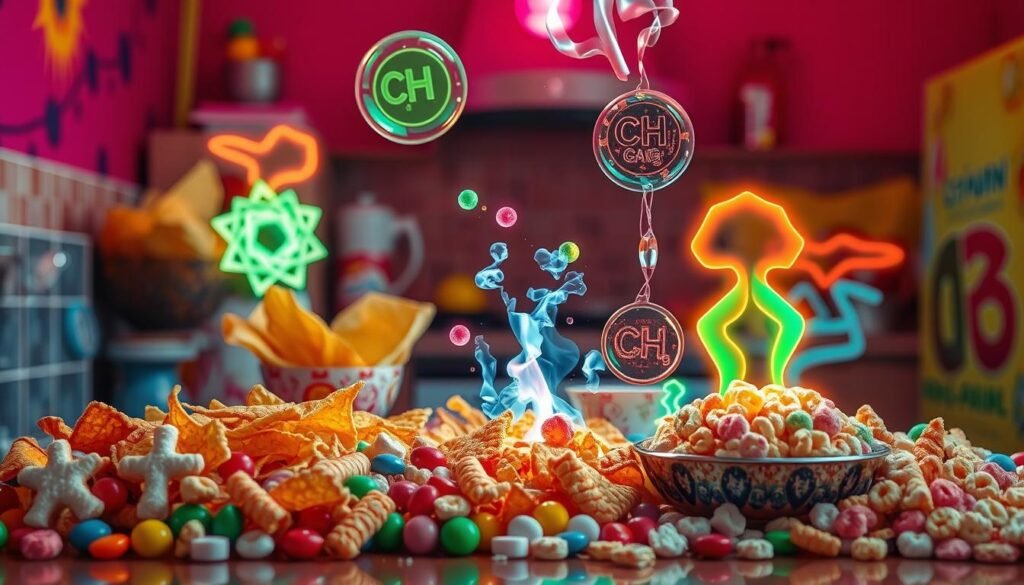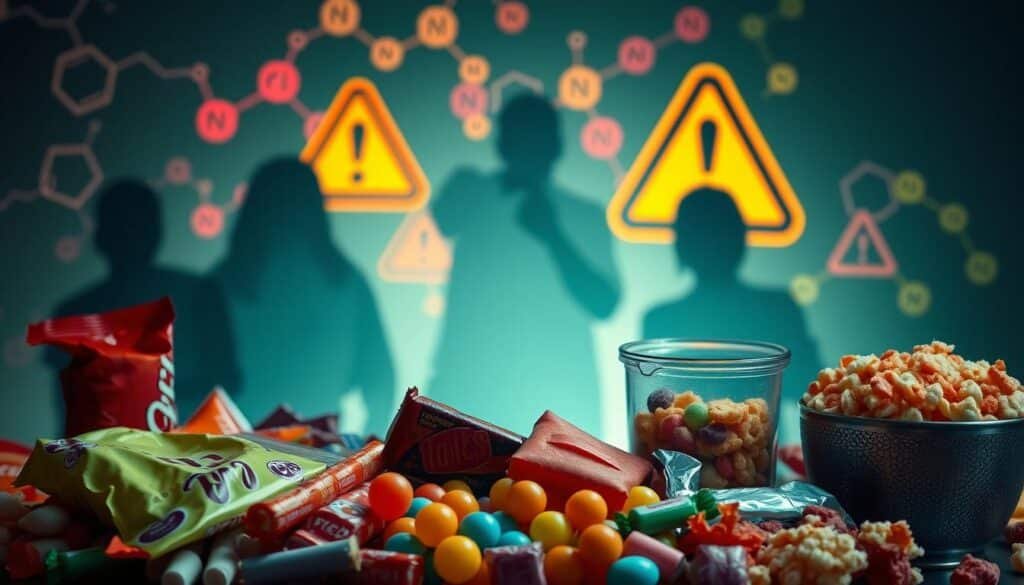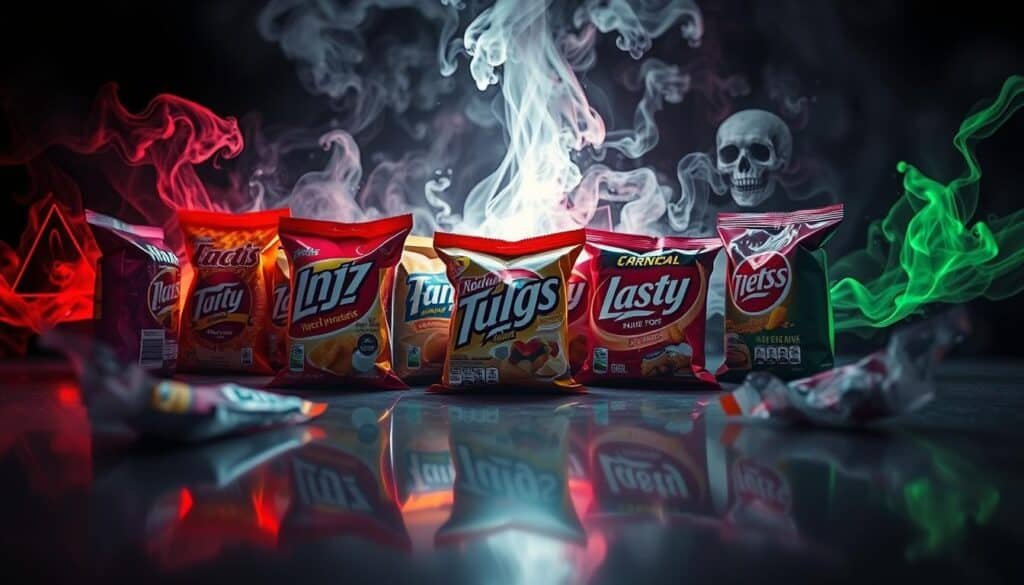Fast food and processed meals are common in many American diets. They offer convenience and are affordable. But, they are often high in calories, fat, and sugar. Eating them regularly can lead to weight gain, heart disease, and diabetes.
While it’s okay to indulge sometimes, there are hidden dangers in these foods. Ingredients like natural beef flavor and potassium bromate can cause health problems.
Key Takeaways : Junk Foods
- Many fast food and processed foods contain unhealthy additives and preservatives that can harm your health.
- Common additives like potassium bromate, TBHQ, and phosphate additives have been linked to cancer, weakened immune systems, and kidney/heart problems.
- Chemicals like phthalates and fluorine found in food packaging can also leach into the food and cause hormonal imbalances and other diseases.
- Consuming too much sugar, sodium, trans fats, and artificial ingredients in processed foods can contribute to obesity, heart disease, and chronic health conditions.
- Making informed choices by reading food labels and opting for whole, unprocessed foods can help mitigate the health risks associated with hidden ingredients in junk foods.
Understanding Common Food Additives and Preservatives
The food industry uses many additives and preservatives to make foods taste better and last longer. These include chemical preservatives, artificial colors, and flavors. But, these substances have raised health concerns, especially about food preservatives, artificial flavors, texture additives, and junk food ingredients.
Chemical Preservatives in Processed Foods
Chemical preservatives like sodium nitrite are used to keep meats fresh. Research shows they might increase cancer risks. Monosodium glutamate (MSG) can also lead to weight gain and metabolic problems in some people.
Artificial Colors and Flavoring Agents
Artificial colors like Blue 1, Red 40, Yellow 5, and Yellow 6 can cause allergic reactions and hyperactivity in kids. Red 3 (erythrosine) has been linked to thyroid tumors in animal studies, raising safety concerns.
Synthetic Texture Enhancers
Processed foods often have synthetic texture enhancers like cellulose (wood pulp) and propylene glycol. While some, like guar gum, might be healthy, their widespread use in junk food ingredients is concerning.
The food industry’s reliance on food preservatives, artificial flavors, and texture additives is growing. It’s important for people to know the risks of these junk food ingredients. Being aware is the first step to making better, healthier choices.
| Additive | Purpose | Potential Health Concerns |
|---|---|---|
| Sodium Nitrite | Curing and preserving meats | Increased risk of certain cancers |
| Monosodium Glutamate (MSG) | Flavor enhancer | Weight gain, metabolic issues |
| Artificial Food Coloring | Enhancing visual appeal | Allergic reactions, hyperactivity |
| Cellulose (Wood Pulp) | Thickening and stabilizing | Potential digestive issues |
| Propylene Glycol | Solvent for flavors and colorings | Potential toxicity concerns |
The Most Shocking Ingredients in Junk Foods

Looking at your favorite junk foods, the ingredients list can be full of surprises. You’ll find everything from insect dyes to preservatives made from petroleum. These additives are part of the processed food industry’s secret recipe. Let’s explore some of the most surprising ingredients in your favorite treats.
- Carminic acid, a red dye from crushed female scale insects called cochineal, is in some chicken nuggets and fast food.
- Mechanically separated meat, or “pink slime,” is the main protein in many fast food chicken nuggets. It’s dyed to look like white chicken.
- TBHQ, a preservative from petroleum, is in Chicken McNuggets, french fries, and other junk foods. It helps them last longer.
- L-cysteine, made from duck feathers and human hair, softens bread dough in fast food. It makes the dough easier to work with.
- Azodicarbonamide, also in rubber yoga mats, is in over 500 U.S. food products. It’s found in some fast food buns and breads.
These examples show the shocking ingredients in your favorite junk foods. With over 10,000 chemicals allowed in U.S. food, the industry uses many unusual and possibly harmful additives.
As consumers, knowing about these hidden ingredients is key. By understanding what’s in junk food, we can choose better for our health and the health of our families.
Health Risks Associated with Hidden Ingredients

Junk foods may taste good, but they can harm our health. They contain hidden ingredients that can upset our gut health and raise the risk of chronic diseases. This is especially true for children.
Impact on Gut Health and Digestion
Processed foods often have emulsifiers. These have been linked to a higher risk of type 2 diabetes. They can mess with our gut health and cause inflammation. This can lead to digestive problems.
Links to Chronic Diseases
Artificial colors and flavorings in foods may increase the risk of brain cancer and hyperactivity in kids. Phosphate additives can harm our bones and hearts. Caramel coloring is linked to cancer and leukemia.
Effects on Children’s Health
Children’s bodies and minds are more sensitive to food additives. MSG, for example, can cause headaches and behavioral issues in some. It’s crucial to protect kids from harmful foods.
| Ingredient | Health Risks |
|---|---|
| Emulsifiers | Increased risk of type 2 diabetes, gut microbiota disruption, inflammation |
| Artificial Colors and Flavorings | Increased risk of brain cancer, hyperactivity in children |
| Phosphate Additives | Negative impacts on bone and heart health |
| Caramel Coloring | Thyroid, liver, and lung cancer, leukemia |
| MSG (Monosodium Glutamate) | Various symptoms in sensitive individuals, including headaches and behavioral changes |
“Protecting children’s health should be a top priority when it comes to the food they consume.”
Dangerous Food Packaging Chemicals

The food we eat is not the only source of harmful chemicals. The packaging of our favorite junk foods can also be dangerous. These chemicals can leak into our meals, posing serious health risks.
Phthalates are a major concern. They are found in take-home boxes, plastic containers, and food preparation gloves. These chemicals can disrupt hormones, cause thyroid problems, affect reproduction, and increase cancer risk. A study showed that eating burgers and sandwiches from fast-food places can lead to higher phthalate levels in our bodies.
PFASs, or “forever chemicals,” are another danger. They are linked to cancer, fertility issues, low birth weight, and weakened immune systems. Fast-food packaging often contains high levels of these chemicals.
| Chemical | Health Concerns | Sources |
|---|---|---|
| Phthalates | Hormonal imbalances, thyroid issues, reproductive problems, certain cancers | Take-home boxes, plastic containers, food preparation gloves |
| PFASs | Cancer, fertility issues, low birth weight, weakened immune systems | Fast-food packaging |
| Styrene | Possible carcinogen | Polystyrene food and beverage packaging |
| Antimony Trioxide | Carcinogen | PET plastic beverage containers |
The widespread use of these harmful chemicals in food packaging is alarming. They can contaminate our food and expose us to health risks. As consumers, we must be aware of these dangers. We should push for safer, more transparent packaging in the food industry.
Also Read : 10 Quick And Easy Air Fryer Recipes For Busy Days
Conclusion
Hidden ingredients in junk foods make it crucial to watch what we eat. Reading food labels carefully and choosing whole foods is key. This helps us avoid harmful additives and promotes healthy eating.
Supporting brands that are open about their ingredients is also important. This way, we can make choices that are good for our health in the long run. By being aware of food labels and choosing clean eating, we empower ourselves to eat better.
Cooking at home gives us control over what we eat. It lets us feed our bodies with foods that are good for us. While it’s okay to enjoy processed snacks sometimes, eating them too often can harm our health.
It can lead to weight gain, chronic diseases, and not getting enough nutrients. Knowing about the effects of food additives and pushing for clear labeling can help. This effort can lead to healthier, more sustainable food choices.
By eating mindfully and balancing our diets, we benefit our health and the planet. This approach is good for us and for our communities and the environment.
FAQs
Q: What are the health effects of consuming junk food?
A: The health effects of consuming junk food can include increased risk of obesity, heart disease, diabetes, and other chronic conditions. Junk food typically has low nutritional value, high levels of fat, sugar, and salt, which can adversely affect overall health.
Q: How does junk food consumption contribute to obesity?
A: Junk food consumption often leads to overeating due to its high calorie content and addictive nature. The World Health Organization has identified the intake of junk food as a significant risk factor for obesity, especially when combined with sedentary lifestyles.
Q: What types of junk food should I eat less of?
A: You should consider eating less of ultra-processed food items such as sugary snacks, fast food, and beverages high in sugar. These types of junk food often lack essential vitamins and minerals and contribute to unhealthy eating habits.
Q: Can I still enjoy junk food while trying to eat healthy?
A: Yes, you can enjoy junk food in moderation. Healthy eating can include occasional treats, but it’s important to balance your diet with nutritious foods. Aim to eat less junk and focus on incorporating more healthy food options into your meals.
Q: What are some strategies to reduce junk food intake?
A: Strategies to reduce junk food intake include planning meals ahead of time, keeping healthy snacks on hand, and being mindful of food cravings. Additionally, educating yourself about the impact of fast food consumption can help you make better choices.
Q: How does food marketing influence junk food consumption?
A: Food marketing often promotes junk food products as convenient and appealing, which can lead to increased consumption. Effective advertising, particularly targeted at children, can create unhealthy eating habits and cravings for these types of food.
Q: What can I replace junk food with to improve my health?
A: To improve your health, consider replacing junk food with healthier options such as fruits, vegetables, whole grains, and plant foods. These alternatives are rich in fiber, vitamins, and minerals, promoting better eating habits and reducing the risk of health issues.
Q: Are there any long-term effects of a high junk food diet?
A: Yes, a long-term high junk food diet can lead to serious health consequences, including chronic conditions like obesity, cardiovascular diseases, and diabetes. It can also negatively impact mental health, leading to food addiction and poor eating habits.
Q: How can I educate myself about the nutritional content of junk food?
A: You can educate yourself by reading food labels, researching nutritional information online, and being aware of the ingredients in junk food products. Understanding what you are consuming can help you make informed decisions and promote healthier eating habits.
Source Links
- https://www.eatthis.com/toxic-ingredients-in-fast-food/
- https://medium.com/illumination/the-hidden-dangers-lurking-in-your-favorite-foods-are-you-at-risk-66c587ebe13a
- https://www.dailymail.co.uk/health/article-11592103/Hidden-toxins-favorite-foods-treats-REVEALED.html
- https://www.healthline.com/nutrition/common-food-additives
- https://www.who.int/news-room/fact-sheets/detail/food-additives
- https://chefsforseniors.com/blog/navigating-common-food-additives/
- https://www.flavournetwork.ca/article/scary-ingredients-lurking-in-fast-food/
- https://www.ewg.org/consumer-guides/ewgs-dirty-dozen-guide-food-chemicals-top-12-avoid
- https://www.healthline.com/nutrition/unhealthiest-junk-foods
- https://pmc.ncbi.nlm.nih.gov/articles/PMC6146358/
- https://mediarelations.gwu.edu/potentially-harmful-industrial-chemicals-detected-us-fast-foods
- https://www.gurukultheschool.com/blog/hidden-ingredients-in-junk-food–do-you-know-what-you-are-really-eating
- https://www.consumerreports.org/health/food-contaminants/dangerous-pfas-chemicals-are-in-your-food-packaging-a3786252074/
- https://foodpackagingforum.org/news/report-finds-harmful-chemicals-widespread-in-packaged-and-processed-foods
- https://www.bcpp.org/resource/food-packaging-chemicals/
- https://kids.frontiersin.org/articles/10.3389/frym.2022.694523
- https://www.medicoverhospitals.in/articles/effects-of-junk-food
- https://www.netmeds.com/health-library/post/junk-food-vs-healthy-food-advantages-disadvantages-and-healthier-food-choices?srsltid=AfmBOopDRReoH5pN6R66Gea26wRZQ_QlWtSz12fCqidknOeg66eYr54v








Leave A Comment